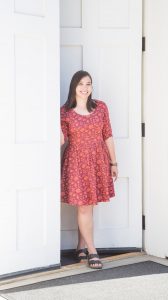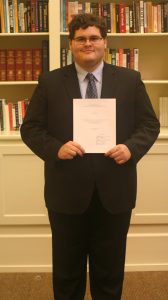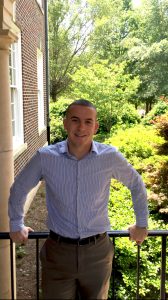
Trent Small-Towns enjoys a relaxing moment in China, where he will complete his study abroad experience. Submitted photo
OXFORD, Miss. – Six University of Mississippi undergraduate students have won prestigious national scholarships to study foreign languages considered critical to U.S. economic, diplomatic and security interests.
The Critical Language Scholarships are given annually by the U.S. Department of State. They are competitive, with undergraduate, master’s, Ph.D. and M.D. students vying for the funds. Recipients of the awards also include students from the Columbia, Georgetown and Harvard universities and the universities of Chicago and California at Berkeley.
“We are tremendously proud of the six Ole Miss recipients of this prestigious, competitive scholarship awards,” Chancellor Jeffrey Vitter said. “What a great opportunity for these students to enhance their critical language and cultural skills.
“Their selection for these scholarships is certainly a reflection of their high level of achievement and hard work. It is also a testament to the strength and excellence of the university’s language and international programs.”
The five UM winners of the Critical Language Scholarships are Meredith Brown, a sophomore Chinese and accountancy major from Oxford; Tyler Caple, a sophomore Chinese and international studies major from Huntsville, Alabama; Mary Frances Holland, a sophomore international studies major with a Russian minor from Lucedale; Trent Small-Towns, a sophomore Chinese and integrated marketing communications major from Atlanta; and Chase Young, a senior international studies and Arabic major from Hattiesburg.
These students are among about 550 American students at U.S. colleges and universities who received a Critical Language Scholarship in 2017.
Nathaniel Williams, a senior Arabic major from North Hampton, New Hampshire, received a Summer Arabic Language and Media, or SALAM, Scholarship, which is given to students who study Arabic and is hosted by the Sultanate of Oman. Williams will spend six weeks studying Modern Standard Arabic as well as the Gulf Arabic Dialect.
Brown, Caple and Small-Towns are all members of UM’s Chinese Language Flagship Program. Brown is going to study in Dalian, China; Caple is headed to Changchun, China; and Small-Towns is off to Xi’an, China.
Williams will study in Manah, Oman, and Young is headed to Meknes, Morocco. Holland is headed to Nizhny Novgorod, Russia.
Each recipient flies to Washington, D.C., for orientation, where they will meet with students going to other parts of the world to study. Then they will fly to their language sites, where they will have classes for at least four hours a day and excursions to cultural and historical sites.
“Since 2008, 31 UM students, including this year’s five recipients, have earned this prestigious award,” said Daniel
O’Sullivan, interim chair and professor of modern languages. “Our rate of success is higher than most SEC institutions, many of which are much larger than UM, and I think it demonstrates the University of Mississippi is where serious language students enroll.
“Continued student success further testifies to the dedication of our skilled faculty. We are proud of students and professors alike.”
The languages these students will study are considered quite demanding. According to ratings by the Foreign Service Institute, Arabic and Chinese are in the highest category of difficulty for English speakers. Russian is in the next highest category of difficulty.
Each UM student has prepared for their time abroad. Brown is the first female accountancy student to win one of these scholarships to study Chinese. She is also just the fifth accounting student to win a Critical Language Scholarship in the history of the program.
“I was shocked because I knew many people applied and the program is very selective,” said Brown, who will spend the summer studying at the Dalian University of Technology, considered a top university in China. A city of just under 7 million people, Dalian is a major finance and high-tech center in China and home one of Intel’s major chip fabrication plants.
“This summer, I hope I can not only make progress on my goal toward fluency, but also absorb Chinese social customs and cultural differences, which would help me in the future to bridge the gap between Chinese and American professionals.”

Mary Holland will be studying Russian in Nizhyn Novgorod, Russia’s fifth-largest city. Submitted photo
Small-Town said he is looking forward to interacting with peers and strangers who may be different from himself.
“I want to see the terra cotta warrior statues,” he said. “I learned most of my Chinese history from textbooks, so it will be interesting to see it even more contextualized in real life. I’m also really looking forward to all the different types of foods Xi’an has to offer.”
Caple, Holland and Young are all students in the university’s Croft Institute for International Studies. Small-Towns is enrolled in the Meek School of Journalism and New Media.
“Most of my time will be spent taking language classes at the Changchun Northeast Normal University in Changchun, Jilin, China,” Caple said. “Later in life, I would like to work in global health and/or environmental policy.
“I believe that Chinese is a good choice for this kind of policy work, since China and the U.S. are the top carbon emitters of the world, but are also the two largest countries doing the most sustainable energy research.”
Holland said she was doing homework one afternoon when the email notification appeared on her phone. She read over the selection, speechless.
“I had applied for the scholarship the previous year and did not get past the semifinalist round, so this news was wonderful and exciting,” she said. “For the days following, it barely seemed real.”
She will be studying in Nizhny Novgorod, which is about five hours east of Moscow and is Russia’s fifth-largest city. There Holland will be in intensive Russian classes five days a week, followed by group excursions around the city.
“I am most excited to visit Nizhny Novgorod’s Kremlin, located in the center of the city,” Holland said. “I will also be studying abroad in Moscow during the fall semester.
“I hope this summer experience will help prepare me, linguistically, for long-term study in Russia. I foresee this experience being critical in improving my understanding of Russian culture, necessary for an international business career.”

Chase Young, a senior international studies and Arabic major, defends his senior thesis in the Croft Institute for International Studies. Submitted photo
Williams received a Critical Language Scholarship last summer and studied in Tangiers, Morocco. Although he graduated in May, Williams was still two credits shy of the Arabic requirement for his degree.
“I needed this scholarship or I would have to study abroad and pay out of my own pocket for it,” he said. “This experience will play a vital role in my career path as I move forward working for the United States government in various capacities where I will be using the Arabic language.
“Having both the ability to continue my studies of the Arabic language while simultaneously gaining firsthand knowledge about a new culture will be extremely beneficial.”
“Critical” languages are those that are less commonly taught in U.S. schools but are essential for America’s engagement with the world. Since 2006, the State Department has awarded scholarships to more than 5,200 American students to learn critical languages around the world.
Critical language scholars are among the more than 50,000 academic and professional exchange program participants supported annually by the U.S. Department of State’s Bureau of Educational and Cultural Affairs.
For more about the Critical Language Scholarship Program, visit http://www.clscholarship.org/.


